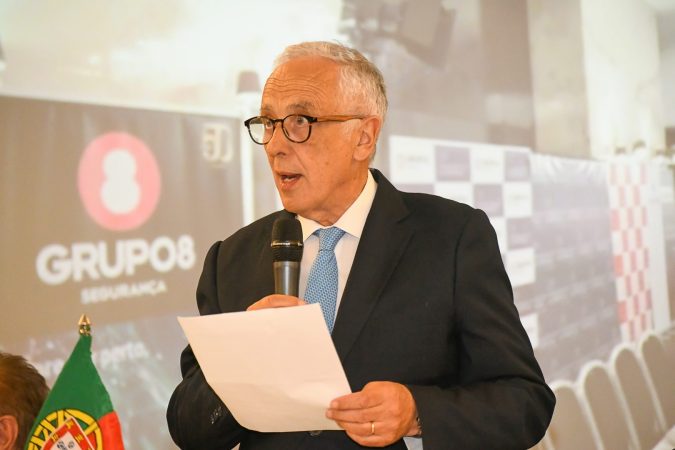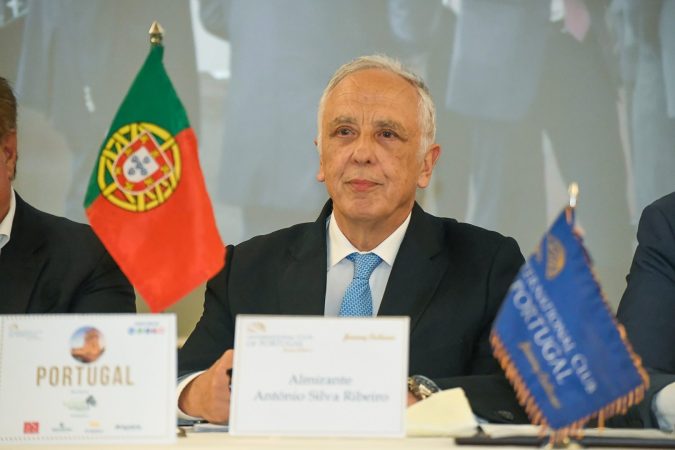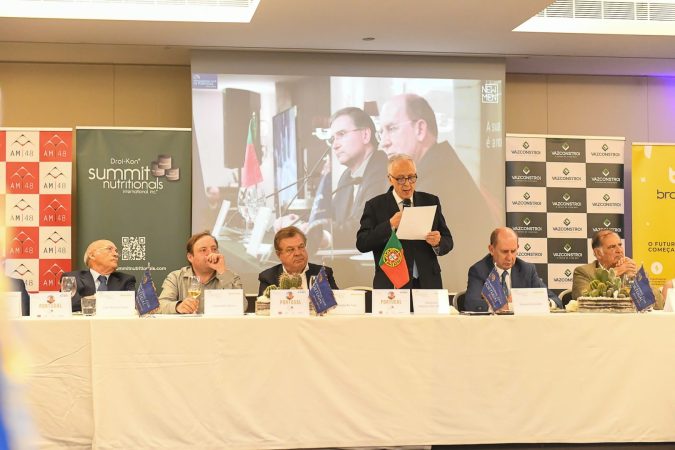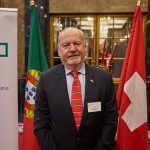The Challenges of Investment in Portugal’s Defence
The European Union and European NATO countries now know they must accelerate rearmament through increased defence spending to 5% of Member-State and non-Member-State GDP, innovative governance, and deeper cooperation to counter Russian aggression and shifting US policies and priorities towards China.
And as a founding member of NATO and a member of the EU Portugal must also step up to the plate. But as Portugal already struggles to keep within the 3% EU annual budget deficit amounts, can Portugal afford it and how can it find the funds? The former Chief of the General Staff the Portuguese Armed Forces, Admiral António da Silva Ribeiro explained at a Lisbon lunch organised by the International Club of Portugal on June 17.
Text: Chris Graeme; Photos: Fernando Bento (ICPT)
For decades the EU was convinced that peace in Europe was secured by economic and diplomatic interdependencies, shared democratic values, and protection from the United States.
But on February 22, 2022 all the changed when Ukraine was invaded by Russia, violating the United Nations Charter, and bringing a high-intensity war between two countries to Europe in the worst conflict since the Yugoslav Wars and ensuring Bosnia Conflict.
What we are seeing in Ukraine and the Middle East and their neighbors is that military force has “returned to be a habit” in international relations.
China – an expanding global actor
Admiral António da Silva Ribeiro explained that China is a global actor in expansion, with three distinct modi operandi which are similar if not equal to what Portugal pursued from 1316 and consolidated from 1415 when its armed forces at the time attacked Ceuta in North Africa.
China, for economic reasons, is pursing a policy of economic penetration with “trading outpost assets” in the North Atlantic at Sines and Vigo, in the South Atlantic through the Panama Canal and ports in Brazil.
At the same time it has made “very solid technological developments” in cars and telecoms with China leading in all these sectors while displaying “a growing military assertiveness”.
“China, as was the case with Portugal in the early 15th century, will only launch a military offensive when it has a powerful navy capable of controlling the oceans, although it is still inferior to the US navy”, said the admiral.
There was also a strategic convergence between Russia and China with declared coordinated policies, joint military maneuvers, similar behaviour in international forums, and an attitude that is accelerating competition among the great powers while geopolitical balances are increasingly vulnerable, leaving the western democracies feel threatened.

An unpredictable transatlantic alliance
The United States is shifting its strategic focus from Europe to the Far East due to a combination of factors, including the rise of China as a global power, the need to deter potential conflicts in the Indo-Pacific region, and a desire for NATO members to share more of the cost of defence and a perception that Europe needs to take greater responsibility for its own security and defense
“We also have to live with the growing unpredictability of the transatlantic alliance because of President Trump’s partial or total reduced commitment on collective defence, and the things he says on collective defence and NATO”, said Admiral da Silva Ribeiro.
“The question for Europe now is if we should continue to be dependent on the US to maintain our security?”
“And then there is the question of the strategic autonomy of the EU which cannot and should not mean, in my view, a break with NATO, or require a partial or full duplication of resources”, he added putting pay to any ideas of a European defence force.
It should rather mean having the capacities to react in an independent way when vital interests are at risk, which means granting NATO control systems to have its own operational capacities, a robust technological-industrial base in Portugal which had been degraded since April 25 1974, and a common strategic culture and European nuclear deterrence.
“We have a common defence policy in Europe and a European Defence Fund, but the EU does not have a a Rapid Reaction Defence Force at an operational level capable of quickly reacting and taking decisions in a conflict”, said the admiral.

Increased spending not enough
But European policy was not cohesive to face threats in a coordinated and decisive way. The capacity to replace armaments is reduced, there is not a suitable dovetailing and regulation of systems, and we done’t have technological and industrial independence to meet a high-intensity conflict.
In order to fill these gaps Europe needed to show a greater cohesion, coordination and determination to understand that European defence was not built with budgets alone and that increased defence spending was not enough to guarantee an effective European defence, but required European leadership, strategic vision, cohesion and convergence, mutual trust and a shared spirit of mission.
“From my point of view we need a European intervention command to coordinate the interoperability between the European armed forces, information sharing – which doesn’t happen – and joint operational and strategic planning in NATO”, said Admiral da Silva Ribeiro.
“The technological-defence base should be integrated, technologically advanced, and capable of responding to the needs of Member-States, and the European Defence Fund and the recently created REACT-EU should foster research and development in AI and cyber defence, strategic defence and sustainable energies”.
A common defence strategy
The admiral proposed creating a culture of a common defence strategy to understand strategies and objectives in a coherent way.
He criticised the absurdity of having 27 military academies, 27 naval schools, and 27 airforce academies in the EU – unlike the United States which didn’t for each of its 50 states – each one with its own doctrine, decisions, and perceptions on what is happening in the world.
“We need to gradually create a European Defence Academy where the defence personnel in each country have to attend its courses”, he suggested.
And added: “We must reinforce exchanges between the different military academies, although we do have Military Erasmus, and we need to foster education on strategic citizenship in secondary schools and universities in the EU”.
Immigrants have a duty to protect Portugal
Portugal has seen a ballooning rise in immigration with a significant number obtaining Portuguese citizenship or BI identity card.
Admiral da Silva Ribeiro says immigrants are not always aware of what citizenship means in terms of duties in a situation that puts Portugal’s sovereignty and independence at risk, and thinks that as pat of the formal process for Portuguese citizenship “it should be explained what their duties are towards protecting this country”.
There needed to be a “moral rearmament for Europe”, because defence required that these people understood the impotence of preserving the essential values of democracy, the State of Law, human rights in the EU and the international community.
“This not just ethics but a strategic necessity of deterrence that is only sustained by political legitimacy, and the collective commitment of citizens to its structures and international organizations,” he said.

France taking the lead in EU defence
Admiral da Silva Ribeiro says that France should take the lead in any collective European defence policy because it is the only country that has an independent nuclear deterrent, a sustained global military presence, a highly-developed defence industry, and a consolidated strategic policy.
“This leadership should not be an imposition, it should be a shared process, one that is articulated and respects the diversity of interests and sensibilities and should be structured around Franco-German cooperation, because France has a military capacity and strategic and industrial defence culture, and Germany has an industrial and technological capacity integrated with the capacities of the other EU member states would make for a capable European defence structure.

Portugal’s defence requirements
Portugal has a relevant strategic role in Europe because of its Euro-Atlantic position, the size of its Exclusive Maritime Zone including the Azores and Madeira, and its membership of NATO. This relevance needed to be accepted and translated into capacities.
This evidently implies that a strategic vision is adopted and a transformation in defense at various levels nationally, and adopt some structural measures. So how can Portugal lend capacity to the Portuguese armed forces over the next 10 years while assuming that we have reached an agreement to increase NATO defense spending by 5% with 3.5% for military capacities and 1.5% to boost resilience?
“I think that we need a new strategic Vision for national defence in Portugal. It is important that our armed forces are capable of actively contributing to regional stability in the Atlantic and Mediterranean, in the Gulf of Guinea and the South flank of the EU and NATO.
“We should also guarantee this vision by contemplating a national military readiness that develops synergies in defence, internal security, industry, education, and science”, he said.
We need to capacitate Portuguese armed forces with deterrence and credible expeditionary capacities, so that they are prepared and have all the logistic, organisational and operational capacities to carry out high intensity operations”, he added.
This implied at a doctrinal level the need to develop a concept of joint forces and multi-domain operations on land, sea, air, cyberspace and space.
At an organisational level Portugal needed to reinforce the integrated strategic planning of the armed forces, the capacity to act in high-intensity situations in support of allies, while in society a new relationship between defence and youth needed to be created with an impact on education and social cohesion, while in the economy defence has to be a driver for innovation, exports, and industrial production.
In terms of structural measures, this implied a change in Portugal’s military programme law, and for the National Defence Institute (NDI) to change its mission in some respects.
Today Portugal’s NDI is for national defence training, equipped to anticipate risks and support defence policy, but it should be able to develop partnerships with higher education institutes, civil organisations and industry. Defence industries should develop products creating a Portuguese defence brand, promoting exports.
The armed forces should also reinforce is command and control systems in terms of training, computers, surveillance, reconnaissance, and cybersecurity defense capacities, creating cyber intelligence and cybernetic forces; training and certification of personnel, and at the information level continue the work of bolstering its information operational units; they have done an extraordinary work on EU and NATO missions; AI, the best equipment, SUVs, and analytical platforms.
Updating military hardware
Over the next 10 years the Portuguese navy will need to substitute 5 frigates, eight helicopters, buy one or two submarines, recover its capacity for war mines, robots, SUVs, SVs, all of which are important to give Portugal’s navy capacity.
“We have to get out of this situation where we don’t have armored vehicles. In any operational high-intensity theatre with fusiliers you have to have these armored vehicles to avoid casualties.
Portugal’s armoured vehicle fleet primarily consists of Pandur II 8×8 vehicles in various configurations, including Infantry Fighting Vehicles (IFVs) and Infantry Carrier Vehicles (ICVs). The Portuguese Army also operates Leopard 2A6 main battle tanks and M113 armored personnel carriers. Additionally, the army has a rapid reaction brigade equipped with light 4×4 armored vehicles
“We have to provide light armored vehicles to our fusiliers and combat and control systems. Our armed forces have three brigades, a heavy, medium and light. The heavy brigade is the backbone of our forces and we have to ensure that the existing resources we have are modernised, technically advanced and operable”, he explained.
But a mechanised brigade costs money and the probability of it being used is not very great. The medium and light brigade needs 8×8 armored vehicles, light armored vehicles, and short-range air systems, plus modernised combat engineering and auxiliary services.
Portugal’s air force needs to replace the F16s (Portugal has 20) and there is some controversy as to whether Portugal should buy European aircraft or Lockheed Martin F-35s. Saab JAS 39 Gripens, the Eurowing Typhoons and Dassault Rafales are cheaper than the F-35s but are fourth generation aircraft, and these aircraft don’t have a stealth capacity.
“If we buy an aircraft it needs to last for 30 years, if we buy aircraft that don’t have this stealth capacity we would in all probability only be able to use them in Africa and not in Europe in a high-tensity conflict”, the admiral warned.
The F-35 has positive aspects such as economies of scale, logistical chains, shared costs, and gives continuity to the doctrine, training and areas of action than the air force has at present.
“I think we are heading in the completely wrong direction, and apart from strategic surveillance and attack drones, we don’t have a radar airspace control system to use F-16s aircraft in the Azores so F-16s cannot be fully used there like they can on mainland Portugal and Madeira”, he lamented.
And Portugal needed anti-missile capabilities at its bases – Monte Real, Lisbon (Montijo) and Beja, as well as reinforcing satellite imaging capacities.
Recruitment difficulties
The armed forces also couldn’t continue with the 23,000 military forces personnel that it has which needed to be increased to 30-32,000 effective combatants, otherwise Portugal wouldn’t have the capacity to carry out functions.
“It is very difficult to recruit personnel today because of the large amount of time spent away from family, a wide gap between the demands of missions and career progression, which is why the government needs to explain to the Portuguese that the cohesion of our military forces cannot be solely achieved through appeals for ambition and public recruitment.
“We need permanent incentives for active service personnel, more flexible contracts, a more predictable career progression, a recognition of the skills our military have that can later be transferred to civilian life, a salary review and help with housing”, said Admiral da Silva Ribeiro.

How can Portugal increase its defence spending to 5%
The budget earmarked for defence for military capacities is €3.1Bn representing 1% of Portugal’s GDP.
It has been published by NATO that Portugal is investing €4.4Bn in defence or 1.58% of its GDP.
This increase is the result of salary increases and investment in equipment. The government has set a target for 2% for 2025 to €5.9Bn.
This means investing €1.4Bn or 0.4% of GDP by the end of the year. The new NATO goal is to invest 3.5% of GDP or €10Bn, so Portugal needs to invest a further €5Bn over a timeline that has not been predefined to get to this 3.5% but is broadly understood to be 10 years.
To this, 1.5% has be added, which is the difference between 3.5% and 5%, to be spent on national resilience which adds up to €4.8Bn.
“If NATO countries agree to a budget of 5% of GDP we will have to invest around €14.8Bn per year over 10 years which is the equivalent to the budget of Portugal’s Ministry of Education.
“I think we have a great opportunity to develop the country and through defence develop national industry”, he said.
This investment should be used to develop the country without unbalancing public accounts while contributing to economic, scientific and technological development.
“It’s not enough to make the most of the opportunity that the European Union has given to exclude accounting for defence spending from the deficit because although it might not appear on the budget deficit it will appear in the State debt”, he said.
The admiral also pointed out that Portugal needed to scale back its dependence on buying armaments from overseas.
“We have to use this money to invest in our industry and make defence into a driver of national development.”
“We have to break with this traditional model and adopt another model of rearmament, one that is articulated with economic and industrial policies based on inovation, science and technology, education and infrastructure.”
This new model had to be based on creating sustained and long-lasting value in a country that demands a coordinated defence mobilisation with the ministries, companies, science and technology, higher education, the armed forces, the universities, and research centres.
The admiral outlined a national rearmament and industrial plan with five lines of action.
- Reinforcing national production, prioritising critical areas such as shipbuilding, munitions, tactical vehicles, communications, drones and autonomous systems.
- Creating partnerships with international manufacturers to produce in Portugal and involving technology transfer, particularly regarding aircraft.
- Investing in research and development and innovation involving universities, technology centres, SMEs and the Armed Forces in areas such as cyber defence and AI.
- The technical training and qualification of young people linking professional centres to defence, and military and civil education programmes. The military services could have an essential role in training citizens with useful skills.
- Exporting solutions should be assisted by institutional support for the internationalisation of Portugal’s companies, reinforcing their presence in European and NATO programmes.
As for the other 1.5% which should be spent on a National Civilian Defence and Resilience Plan, this would have eight lines of action.
- To capacitate the National Authority of Emergency and Civil Protection.
- Reinforcing the Republic’s Information Systems.
- Cybersecurity throughout the State and Industrial Technological Resilience.
- Energy and environmental security.
- Education on Defence Security.
- Valuation of Territorial Cohesion – services distribution, training centres, armed forces operations units throughout national territory.
- Develop research and development with the application of know-how, AI, robotics, surveillance, and secure communications.
- Stimulate university programmes and research institutes in strategies and defence technologies.
Over the next 10 years this would be financed by increasing the budget by 0.5% per annum to reach 5%.
Portugal would also need to mobilise EU and international funds such as the European Defence Fund, RearmEU, NATO programmes (the NATO Security Investment Programme (NSIP), the Military Budget, and the Civil Budget), and bi-lateral projects. Also Public and Private Partnerships to provide incentives for national industry, universities and technology companies and research centres.
About Admiral António da Silva Ribeiro
Naval Chief of Defence (Appointed 2016)
Chief of the General Staff the Portuguese Armed Forces (2018-2023) in which he assumed control of operations for the Portuguese armed forces for Portugal, NATO, the EU and the UN.
Invited professor for the Universidade Lusiada with main areas of research in theory of strategy and strategic planning. He has spoken at 300 conferences, published 27 books – 6 of which were published overseas -, written 400 articles on strategy, strategic planning, history and military sociology, and international relations.
With a Masters Degree in Strategic Studies and a PhD in Political Science, he is a contributor to Military Magazine, the Nation and Defense Magazine, and Security and Defense Magazine








